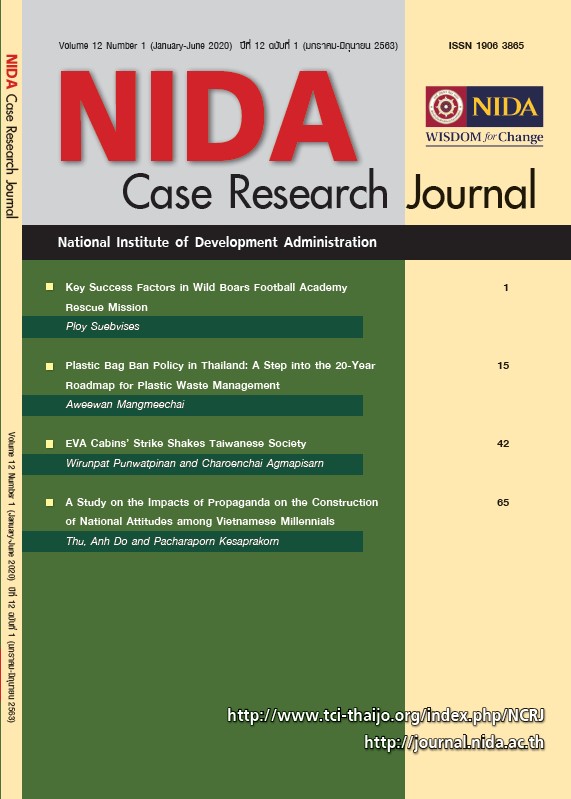Plastic Bag Ban Policy in Thailand: A Step into the 20-Year Roadmap for Plastic Waste Management
Keywords:
Plastic bag ban in Thailand; plastic waste management roadmap; waste managementAbstract
In August, 2019, Mariam, a dugong, died due to the many plastic bags found her stomach. Her death stimulated the current campaign to reduce plastic waste. In July 2019, the Cabinet approved a plastic waste management roadmap for 2018–2030. Starting January 1, 2020, the government enacted a ban on free plastic bags. Seventy five of Thailand’s key retailers are participating in this program after signing onto a plastic bag reduction policy to cease offering free plastic bags with purchases.
As a result of this policy, Warawut Silpa-archa, Minister of Natural Resources and Environment, expects to see a reduction of 0.78 million tons of plastic waste. Many sectors have questioned the seriousness of this policy’s enforcement because the campaigners find that there are still loopholes in solving this problem.
This case study attempts to address the conflicts between the estimates of the amounts of plastic produced, plastic waste generation, plastic waste management (reuse and recycling), the 20-year roadmap, and plastic bag management policies in foreign countries. It compares the environmental impacts of plastic and paper bags and other challenges blocking the success of this new policy. This paper takes the position of an non-governmental organization (NGO) that has monitored government policies by examining claims of the effects of this new policy, data validation, determination of data uncertainty, analysis of the overall picture of this policy with the 20-year roadmap of plastic waste management and assessing the pros and cons of this policy and providing suggestions for the government.
References
Boonbandit, T. (2019). Big retailers pledge to drop plastic bags by 2020. Khaosod. Retrieved from https://www.khaosodenglish.com/life/2019/09/10/big-retailers-pledge-to-drop-plastic-bags-by-2020/
China Zero Waste Alliance. (2018). Ten years from the Plastic Restriction Policy. Retrieved from http://www.lingfeiqi.org/sites/default/files/datadoc/shi_nian_xian_su_ling_shang_jia_zhi_xing_qing_kuang_diao_yan_bao_gao_.pdf
Davies, P. A., & Westgate, R. A. (2018). China’s Action Against Plastic Pollution. Retrieved from https://www.globalelr.com/2018/04/chinas-action-against-plastic-pollution/
Hamilton, L. A., Feit, S., Muffett, C., Kelso, M., Rubright, S. M., Bernhardt, C., . . . Labbe-Bellas, R. (2019). Plastic and Climate: The Hidden Costs of a Plastic Planet. Retrieved from www.ciel.org/plasticandclimate
He, H. (2012). Effects of Environmental Policy on Consumption: Lessons from the Chinese Plastic Bag Regulation. Environment and Developmetn Economics, 17, 407-431.
Marks, D. (2018). What Thailand needs to do to kick its plastic addiction. Bangkok Post. Retrieved from https://www.bangkokpost.com/opinion/opinion/1587290/what-thailand-needs-to-do-to-kick-its-plastic-addiction
Ngo, W. (2017). Environmental Reform in Africa: A Comparative Continental Union Solution Through Plastic Reform Legislation. . Brooklyn Journal of International Law, 43(2), 691-715.
Pisuthipan, A. (2019). This time, it's serious. Bangkok Post. Retrieved from https://www.bangkokpost.com/life/social-and-lifestyle/1801524/this-time-its-serious
Pollution Control Department. (2019). Thailand's Roadmap on Plastic Waste Management 2018-2030. Retrieved from Bangkok, Thailand: http://www.pcd.go.th/Info_serv/File/Plastic%20Roadmap.pdf
Rakrod, P. (2020). 'Do not give away a hand bag voluntarily' Does it really help to reduce plastic pollution!?! Retrieved from https://www.greenpeace.org/thailand/story/11099/plastic-no-single-use-plastic-bag/
Song, G., Zhang, H., Duan, H., & Xu, M. (2018). Packaging waste from food delivery in China’s mega cities. Resources, Conservation and Recycling, 130, 226-227.
State Post Bureau. (2017). 2017 China Express Delivery Green Packaging Development Status and Trend Report
Retrieved from http://www.spb.gov.cn/ztgz/gjyzjzt/lskd/dtyw/201709/t20170915_1326415.html
State Post Bureau of China. (2018). Chinese Statistic Bulletin of Post Business in 2017 Retrieved from http://www.spb.gov.cn/xw/dtxx_15079/201806/t20180604_1581131.html
Taylor, R. L. C. (2019). Bag leakage: The effect of disposable carryout bag regulations on unregulated bags. Journal of Environmental Economics and Management, 93, 254-271.
Thailand Environment Insitute. (2020). Roadmap on plastic waste management. Retrieved from http://www.tei.or.th/th/area_infographic_detail.php?area_id=9&event_id=556
The Government Public Relations Department. (2019). Roadmap on Plastic Waste Management. Retrieved from https://thailand.prd.go.th/1700/ewt/thailand/ewt_news.php?nid=7831&filename=index
Tullo, A. H. (2014). Breaking the Plastic Bag Habit. Retrieved from https://cen.acs.org/articles/92/i37/Breaking-Plastic-Bag-Habit.html
Wattanasukchai, S. (2019). Food apps trade convenience for plastic waste. Bangkok Post. Retrieved from https://www.bangkokpost.com/opinion/opinion/1799699/food-apps-trade-convenience-for-plastic-waste
Wipatayotin, A., & Kongrut, A. (2020). Plastics factories feel bag ban pain. Bangkok Post. Retrieved from https://www.bangkokpost.com/business/1850854/plastics-factories-feel-bag-ban-pain
Xinhua News. (2019). 11-year implementation of the ban on free plastic bag Retrieved from http://www.xinhuanet.com/politics/2019-09/12/c_1124988515.htm
Zhu, Q. (2011). An Appraisal and Analysis of the Law of “Plastic-Bag Ban”. Energy Procedia, 5, 2516-2521.
Downloads
Published
How to Cite
Issue
Section
License
Copyright (c) 2021 NIDA Case Research Journal

This work is licensed under a Creative Commons Attribution-NonCommercial-NoDerivatives 4.0 International License.





